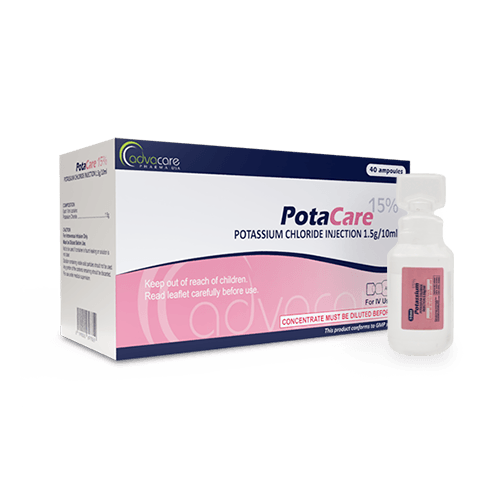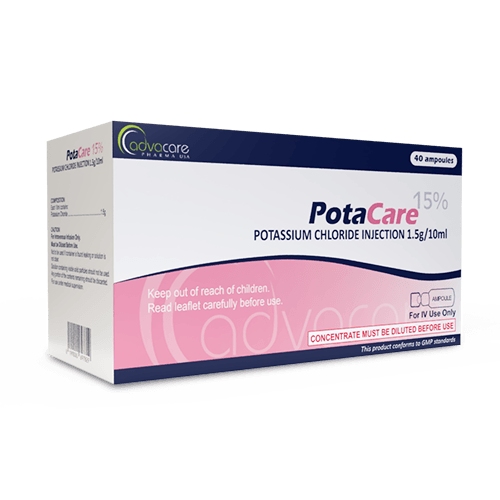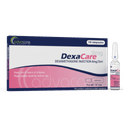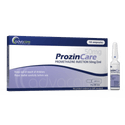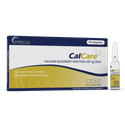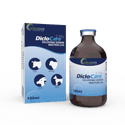- Home›
- Pharmaceuticals›
- Injections›
- Small Volume Injections›
- Potassium Chloride Injection
Potassium Chloride Injection
Dosage
Packaging
What is Potassium Chloride?
Active Ingredients: Potassium Chloride
Potassium Chloride Injection is used to restore severely low levels of potassium in the body. Hypokalemia (low levels of potassium) may be caused by many reasons, such as prolonged illnesses with diarrhea or vomiting, hormone disorders like hyperaldosteronism, or certain medications like diuretics.
Intravenous potassium chloride is given when a patient's blood potassium levels are dangerously low or when a patient is unable to take oral medicines. It is typically administered in a hospital setting, as improper dosing or rapid administration may lead to life-threatening complications.
Potassium chloride (KCl) is a potassium salt that is made of potassium (K) and chlorine (Cl) ions. Potassium is an essential mineral that is needed for proper nerve function, muscle contraction (including heartbeat), and maintaining blood pressure. This electrolyte also helps to regulate overall fluid balance and maintains pH levels in the body.
Potassium Chloride Injection is a hypertonic solution that has been packaged in an ampoule. It is available in two dosages: 1g/10ml (10ml contains 10% w/v (1g) potassium chloride) and 1.5g/10ml (10ml contains 15% w/v (1.5g) potassium chloride). This product is intended for slow IV infusion after diluting with 0.9% sodium chloride.
Each 1g/10ml ampoule contains an ionic composition of potassium (K+): 13.4 mmol and chloride (Cl-):13.4mmol. The ionic composition of the 1.5g/10ml ampoules is potassium (K+) 20mmol and chloride (Cl-) 20mmol.
Potassium Chloride Tablets are also available for distribution.
AdvaCare Pharma is a manufacturer and exporter of Potassium Chloride Injections. We offer a wide range of high-quality and cost-effective medications that are available for distribution. Our medications are produced in our GMP-certified facilities in China, India, and the USA.
Why are we a leading Potassium Chloride manufacturer?
AdvaCare Pharma, a US-owned pharmaceutical company, is a manufacturer of Potassium Chloride Injection with GMP-compliant manufacturing facilities located worldwide. We conduct frequent GMP, third-party and internal facility inspections to ensure that our manufactured injectable treatments exceed the stringent requirements of importing countries and our distributors.
As a renown Potassium Chloride manufacturer and global supplier of 120+ pharmaceutical injection products, our global reach extends to over 65 markets ensuring that pharmaceutical distributors, hospitals, pharmacies, NGOs and government institutions receive the quality-assured treatments they need.
Uses
What is Potassium Chloride used for?
It is used to treat hypokalemia (low levels of potassium). Moderate hypokalaemia is a potassium level of below 3.5/liter, while severe hypokalaemia will have a potassium level of ≤2.5mmol/liter.
Intravenous potassium chloride is sometimes used to provide supplemental potassium therapy for patients who are unable to meet their daily requirements through standard care, such as those who cannot take medications or supplements through the oral route.
What is the difference between Potassium Chloride Injection and Potassium Chloride Tablets?
The primary difference between these two products is their route of administration and their intended uses. Potassium Chloride Injection is typically administered in hospital settings under medical supervision. It is used when there is a need for rapid correction of severe potassium deficiency or in a situation when a patient cannot take potassium orally, such as during a medical emergency. Tablets are ideal for non-emergency situations when a patient needs to increase potassium intake, such as in order to prevent or treat hypokalemia.
How are Potassium Chloride Injections used?
This medication is manufactured as an aqueous solution intended to be given by slow infusion into a vein, with a preference for a large peripheral vein. It should be administered by a healthcare professional in a hospital or clinic setting. This medicine must not be administered by undiluted IV, IM, or SC injection.
Before treatment, this product must be diluted in 0.9% sodium chloride and then mixed thoroughly, such as by inverting the bag/bottle 5 times or more.
Any unused portion of the solution should be discarded after treatment.
Are there any storage specifications for Potassium Chloride Injections? It is advised to keep this product in its original packaging until use. To maintain the integrity of this drug, it is recommended to store ampoules in a location below 25°C, such as a refrigerator.
What dose should be given?
Adult Dosing Dosage may vary based on different medical indications:
- For the treatment of hypokalemia, the usual dose is 40mmol (3 ampoules of the 1g/10ml dosage or 2 ampoules of the 1.5g/10ml) in one liter of 0.9% sodium chloride. The dose should be given over 4 hours. Treatment can be repeated if necessary, in the event that serum potassium level remains < 3mmol/liter or if severe symptoms, such as ECG changes and/or muscle paralysis, persist. The maximum rate is 10mmol per hour.
- For the prevention of hypokalaemia in patients unable to meet daily potassium requirements by traditional routes, the usual daily requirement is 1-2mmol/kg per day.
Pediatric Dosing Recommended dosage for children may vary based on different medical conditions:
- For the treatment of hypokalemia, the usual dose for children over 1 month old is 0.2mmol/kg per hour, for 3 hours. The dosage should be determined based on serum potassium level, age, and weight. The exact dosage will depend on the severity of hypokalemia and the patient’s underlying health conditions.
- For the prevention of hypokalaemia in patients unable to meet daily potassium requirements by traditional routes, the usual daily requirement is 2-3mmol/kg per day.
Refer to a doctor or pharmacist for guidelines on the exact dosage.
Who can use Potassium Chloride?
Potassium Chloride Injection can be administered to adults and children, but caution is advised for specific groups of patients.
Pregnant Potassium chloride can be given to pregnant women if there is a clinical need. Though it is not expected to cause fetal harm, there is no human data on the use of parenteral potassium chloride in this population.
Breastfeeding The benefits must be weighed against any risks before treating women who are breastfeeding. Though no human data is available, potassium chloride is not expected to have adverse effects on milk properties or the infant.
Children It is important to monitor plasma electrolyte concentrations in pediatric patients with impaired ability to regulate fluids or electrolytes.
Geriatric Potassium chloride should be administered with caution to older patients, as there is an increased risk of hyponatremia and hyponatremic encephalopathy.
What are the symptoms of an overdose of Potassium Chloride?
Toxic levels of potassium chloride may present as confusion, weakness, hypotension, muscular or respiratory paralysis, arrhythmias, heart block, electrocardiographic abnormalities, and cardiovascular collapse from cardiac. It is important to note that hyperkalemia is often asymptomatic, and the only indication may be the increase of serum potassium concentration (6.5-8.0mEq/L) and certain types of ECG changes, such as the loss of P-wave, peaking of T-waves, S-T segment depression, and QT interval prolongation.
Other warnings
For patients with renal impairment, the dose should be reduced, particularly if there is concurrent treatment with RAAS inhibitors or NSAIDs. Treatment by IV is contraindicated in patients with renal failure. If it is necessary to treat patients with severe renal impairment, it is important to monitor for symptoms of hypernatremia, hyperkalemia, or fluid overload. In these populations, frequently monitor plasma chloride levels and renal function.
For patients with cirrhosis, the starting dose should be the lowest dose possible. It is important to frequently monitor serum potassium levels.
Therapy with a higher dosage or infusion rate will require continuous electrocardiogram monitoring.
It is recommended to closely monitor the infusion rate to prevent unintentional bolus. Rapid or excessive administration has been associated with hyperkalemia and cardiac conduction and rhythm disorders, which can be fatal for some patients.
Intravenous potassium chloride can cause electrolyte disturbances, which may lead to hypervolemia and congested states. It may be necessary to supply essential electrolytes, minerals, and vitamins.
Great care should be exercised when administering parenteral potassium chloride to patients with renal or cardiovascular insufficiencies, with or without congestive heart failure. This is particularly true for patients who are geriatric or postoperative.
For patients who require a highly concentrated solution (especially those on digitalis), continuous cardiac monitoring and frequent testing for serum potassium and acid-base balance are recommended.
The infusion site should also be monitored for any redness or inflammation. Special care must be taken to avoid extravasation, as it may cause necrosis and complications such as pulmonary embolism from thrombophlebitis.
Side Effects
As with all pharmaceuticals, some unwanted effects can occur from the use of Potassium Chloride Injection.
Common side effects include, but may not be limited to:
- abdominal pain
- diarrhea
- gas
- nausea
- rash
- vomiting
- upset stomach
Contact medical staff if serious side effects occur, such as:
- signs of an allergic reaction
- chest pain
- severe pain, bruising, or other reactions at the site of injection
- severe stomach pain or bloating
- signs of stomach bleeding
- signs of high potassium levels (e.g. nausea, weakness)
For a comprehensive understanding of all potential side effects, consult a medical professional.
If any symptoms persist or worsen, or you notice any other symptoms, please call your doctor.
Precautions
Do NOT use Potassium Chloride Injection if:
- You are allergic to potassium chloride or any other containing ingredients.
- You have hyperkalemia (high potassium levels) or renal failure.
Before treatment, consult your doctor regarding any medications you are taking to address potential drug interactions.Some drugs that are known to interact include ACE inhibitors, aliskiren, angiotensin-II receptor antagonists, potassium-sparing diuretics, ciclosporin, and tacrolimus. This is not a complete list.
This medication may not be suitable for people with certain conditions, so it is important to consult with a doctor if you have any health conditions. Special considerations, alternative dosing, or additional monitoring may be necessary for patients with renal impairment, cirrhosis, cardiovascular disease, arrhythmia, adrenal insufficiency, acidosis, dehydration, or extended tissue breakdown (e.g. burns), or who are at risk of hyponatremia.
Potassium Chloride Injection is incompatible with the additive amphotericin B (ampho B). It should not be administered through the same Y-site as diazepam.
References
Rapid Correction of Hypokalemia Using Concentrated Intravenous Potassium Chloride Infusions
There are many considerations regarding the intravenous administration of potassium chloride infusions for the acute correction of hypokalemia.
This study investigates the effects of 495 sets of potassium chloride infusions given to patients in a medical intensive care unit. Each infusion set comprised one to eight consecutive individual infusions, with each containing 20mEq of potassium chloride in 100mL of saline administered over 1 hour. In total, 1351 individual infusions were administered.
The average preinfusion potassium level was 3.2mmol/L, while the average postinfusion potassium level was 3.9mmol/L. On average, each 20-mEq infusion resulted in a potassium level increase of 0.25 mmol/L.
The results showed that no life-threatening arrhythmias were observed within the same time frame, although mild hyperkalemia occurred in 10 instances.
The conclusion is that there is a possibility for relatively safe use of concentrated (200-mEq/L) potassium chloride infusions at a rate of 20-mEq/h via central or peripheral vein for correcting hypokalemia in intensive care unit patients.

You might be interested in...
Why AdvaCare Pharma?
As an industry leader, we are aware of our responsibility to provide affordable and sustainable solutions to improve healthcare worldwide.
